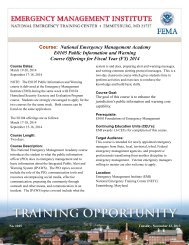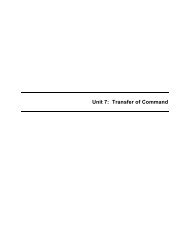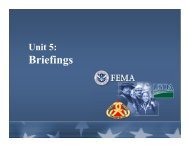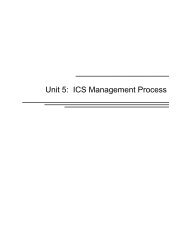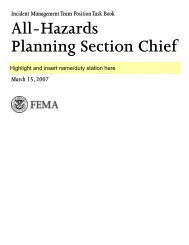enrollment for emi courses - Emergency Management Institute ...
enrollment for emi courses - Emergency Management Institute ...
enrollment for emi courses - Emergency Management Institute ...
You also want an ePaper? Increase the reach of your titles
YUMPU automatically turns print PDFs into web optimized ePapers that Google loves.
statE/lOcal/trIbal fIElD<br />
cOursEs—prEparEDnEss<br />
& tEcHnOlOgy<br />
EmE r g E n c y ma n a g E m E n t In s t I t u t E • 2010-2011 • ca t a l o g of co u r s E s<br />
experienced, proficient, and knowledgeable of<br />
current issues in their field of expertise.<br />
Training Requirements <strong>for</strong> Lead and Unit<br />
Instructors<br />
Instructors should have <strong>for</strong>mal instructor training<br />
(NWCG Facilitative Instructor, M-410, EMI Master<br />
Trainer Program, Office <strong>for</strong> Domestic Preparedness<br />
Instructor Course, or equivalent).<br />
Intermediate Incident command<br />
system (Ics) <strong>for</strong> Expanding Incidents,<br />
Ics-300 (g300)<br />
This course provides training on and resources <strong>for</strong><br />
personnel who require advanced application of<br />
the Incident Command System (ICS). This course<br />
expands upon in<strong>for</strong>mation covered in the ICS-100<br />
and ICS-200 <strong>courses</strong>.<br />
The course objectives are as follows:<br />
• Describe how the NIMS Command and<br />
<strong>Management</strong> component supports the<br />
management of expanding incidents.<br />
• Describe the incident/event management process<br />
<strong>for</strong> supervisors and expanding incidents as<br />
prescribed by the Incident Command System<br />
(ICS).<br />
• Implement the incident management process on<br />
a simulated Type 3 incident.<br />
• Develop an Incident Action Plan <strong>for</strong> a simulated<br />
incident.<br />
ICS-300: Instructor Guidelines (in addition to the<br />
General ICS Instructor Guidelines):<br />
1. Successful completion of accredited IS 100.a,<br />
Introduction to the Incident Command System (ICS), ICS-<br />
100; IS 200.a, Incident Command System (ICS) <strong>for</strong> Single<br />
Resources and Initial Action Incidents, ICS-200; G300,<br />
Intermediate Incident Command System (ICS) <strong>for</strong> Expanding<br />
Incidents, ICS-300; G400, Advanced Incident Command<br />
System (ICS), Command and General Staff—Complex Incidents,<br />
ICS-400; IS 700.a, National Incident <strong>Management</strong> System<br />
(NIMS), An Introduction; and IS 800.b, National Response<br />
Framework (NRF), An Introduction.<br />
FEd E r A L Em E r g E N C y mA N A g E m E N T Ag E N C y 90<br />
2. Service in a mid-level incident management<br />
position within 5 years in real-world incidents,<br />
planned events, or accredited exercises.<br />
3. Recognized qualifications in techniques of<br />
instruction and adult education methodologies.<br />
Selection Criteria: Individuals who may assume a<br />
supervisory role in expanding incidents or Type<br />
3 incidents.<br />
NOTE: During a Type 3 incident, some or all of the Command<br />
and General Staff positions may be activated, as well as Division/<br />
Group Supervisor and/or Unit Leader level positions. These incidents<br />
may extend into multiple operational periods.<br />
Prerequisites:<br />
Required: IS 100.a, Introduction to the Incident Command<br />
System (ICS), ICS-100, and IS 200.a, Incident Command<br />
System (ICS) <strong>for</strong> Single Resources and Initial Action Incidents,<br />
ICS-200.<br />
Recommended: Experience using concepts and<br />
principles from ICS-100 and ICS-200 in a response<br />
or exercise.<br />
Course Length: 18 hours<br />
This course is currently available from your State Training Officer.<br />
weapons of mass Destruction <strong>courses</strong><br />
(g310)<br />
This series of facilitator-led <strong>courses</strong> is intended to<br />
help senior local government officials prepare <strong>for</strong><br />
and improve their ability to manage and respond to<br />
mass casualty terrorism incidents involving the use of<br />
Weapons of Mass Destruction (WMD). Each course<br />
has the same five objectives and each uses a different<br />
scenario to enable participants to accomplish them.<br />
The objectives are stated below.



